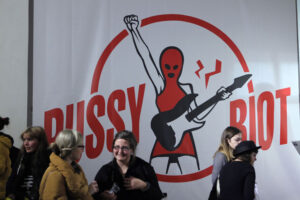

An area of study like feminist, gender, and sexuality studies is interdisciplinary by its very nature, making it right at home in a liberal arts program.
Feminist studies are defined by their focus on women’s rights, the equality of women with men, and an exploration of the social, political, and ideological implications for being female. Gender and sexuality studies look at different aspects of gender identity and gender representation in society.
How a Liberal Arts Curriculum Incorporates Feminist, Gender & Sexuality Studies
Concepts like gender and sexuality have been defined in their own ways according to cultural norms stretching all the way back to antiquity. Women have been striving for equal rights for just as long, though the concept of feminism arose in the nineteenth century.
Examples in the study of feminism, gender, and sexuality give us glimpses into the interdisciplinary natures of these fields:
- Historically, Germany had laws that were extremely condescending to women, and ironically these were reflected in laws against homosexuality.
- Today being queer in Russia is a difficult and sometimes even deadly challenge, and feminist activists share in this struggle.
- Surprisingly Iran has some of the oldest modern laws affirming trans rights.
- On some topics, debates between radical feminists and trans activists have never been more heated than in the present.
Women’s rights, gender, and sexuality studies are broad areas of focus that intersect with an exciting range of liberal arts topics including history, race, ethnicity, economics, literature, religion, and sociology, to name just a few.
LGBTQ Rights Across the World – A Liberal Arts Intersection of History, Politics, and Culture
 Comparing LGBTQ rights in different countries shows a range of cultural and political responses that help to inform the study of gender, sexuality, and women’s rights.
Comparing LGBTQ rights in different countries shows a range of cultural and political responses that help to inform the study of gender, sexuality, and women’s rights.
Germany in the Past – Sodomy was against the law in Germany since before the Weimar Republic up through the Nazi regime, and even continuing in West Germany until 1994. That was, males engaging in homosexual acts could be charged with a crime. But legislation for sexual acts between two women was not even on the books. In effect lesbianism did not exist. This wasn’t a sign of tolerance.
Rather the opposite. The attitude was that those things that women do with each other in private don’t even rise to the level of being sexual or intimate acts. Not criminalizing sexual acts between women was actually an extreme demonstration of belittlement.
Russia Today – Just like in many countries queer rights in Russia are tied together with politics and cultural conflicts. United Russia, the dominant political party since 2007 and backer of Vladimir Putin, has a base comprised of Russian Orthodox, conservative, and anti-Communist supporters. It was recently behind the passage of a law that bans what it calls propaganda of non-traditional sexual relations.
Officially in Russia it’s not illegal to be queer, but laws like the recent one passed are so broad and so vague that suspect members of the queer community can be harassed by authorities at their discretion. The social climate is restrictive and even dangerous.
Groups like Pussy Riot, an all-female performance art collective whose members have been described as being part of a feminist movement, have protested for improved LGBTQ rights and against the role of the Orthodox Church in politics.
As part of one protest they staged an improvised concert in the Cathedral of Christ the Savior in Moscow, just a few steps away from the Kremlin. This earned them a two-year sentence to a penal colony. A deputy of the United Russia party praised this conviction, saying the collective members deserved it.
Iran – Yes, it’s true. Gender reassignment surgery is legal in Iran. In fact, it’s been legal since 1967 when Ayatollah Khomeini issued a religious decree, which he repeated in 1985, stating that sex changes were legal for transsexuals. Yes, that’s the same Ayatollah who supported the 1979 hostage crisis, called for the killing of Salman Rushdie, and called America “the Great Satan.”
Homosexuality is illegal, but to get around this the authorities allow diagnosed transsexuals to change their gender. It’s certainly a unique system, but because of the cultural and political climate –the morality police can arrest you at any time– Iran is still considered to be one of the most dangerous countries in the world for the LGBTQ community.
Cultural, religious, political, historical, and social climates are different in every country, and how these intersect with feminism and gender studies can illuminate a great deal in the broader context of a liberal arts education.
Exploring All Perspectives, Even Unpopular Ones, is Part of the Liberal Arts Experience
 TERF was a term coined in 2008, but recently thrust into public discourse amid the controversy surrounding Dave Chappelle’s Netflix special, The Closer. Standing for, “trans exclusionary radical feminist,” It refers to feminists who don’t want to let trans women into what they describe as female-only spaces. Feminists who fall into this category tend to feel “TERF” is derogatory and instead refer to themselves as “gender critical.”
TERF was a term coined in 2008, but recently thrust into public discourse amid the controversy surrounding Dave Chappelle’s Netflix special, The Closer. Standing for, “trans exclusionary radical feminist,” It refers to feminists who don’t want to let trans women into what they describe as female-only spaces. Feminists who fall into this category tend to feel “TERF” is derogatory and instead refer to themselves as “gender critical.”
Gender critical feminists state that biological women have been discriminated against for millennia, have fought long and hard to gain equal rights with biological men, and have a right to have biologically-female-only spaces.
Trans activists point out that the trans community has long been discriminated against, denied the right to change their bodies how they want, denied the right to marry or adopt children, and have some of the highest rates of suicide. They argue that excluding trans females from biologically-female spaces is a continuation of historical discrimination through the present day; that it’s ethically and morally wrong.
This is a debate that has created much division in the field of feminist and gender studies.
What’s certain is that analyzing this debate in a liberal arts context can provide needed depth to these issues, that includes looking at how they intersect with race, religion, culture, history, philosophy, economics, and ethics. This debate represents the intersection of entire fields that are right at home in a liberal arts degree program:
- Feminism
- Gender studies
- Social reproduction
- Reproductive politics
- Activism






